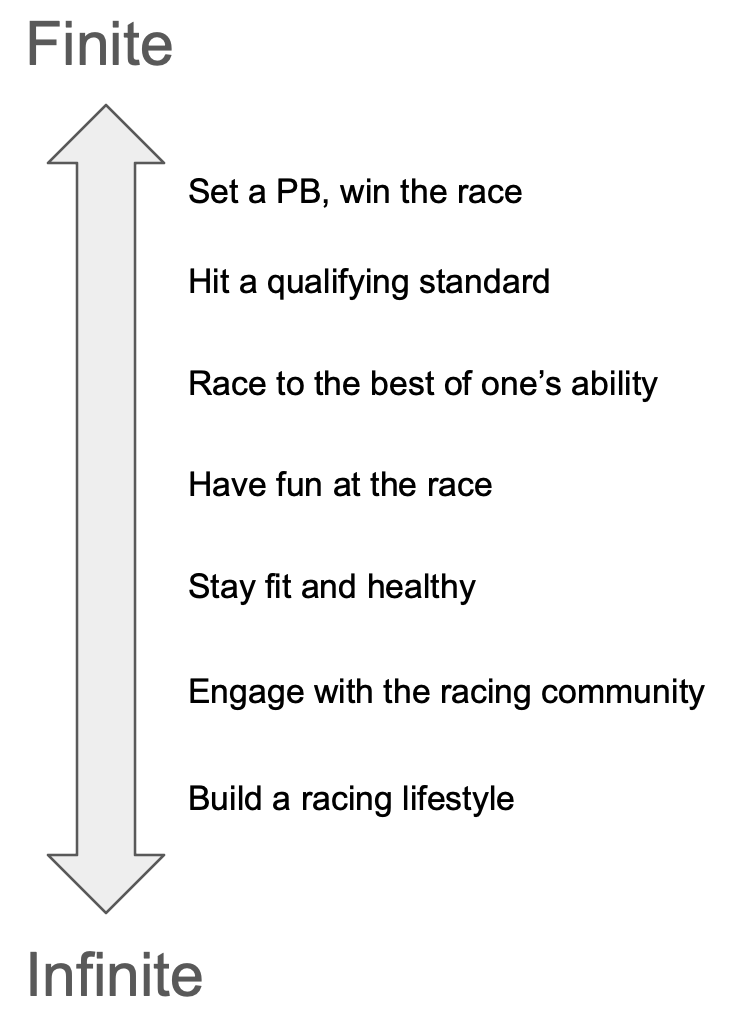Finite and Infinite Games
July 5, 2025
Q: Why did you run today? A: Because I want to run again tomorrow.
The book Finite and Infinite Games by James P. Carse is an exploration of motivation and livelihood. The main thesis is that one can approach any of their pursuits, and life in general, through one of two lenses:
Finite games - A finite game has one clear goal, a beginning and an end, a winner and a loser. The goal of the finite game is to win the game.
Infinite games - An infinite game has no fixed end, no winner and no clear outcome. The goal of the infinite game is to continue playing the game.
Sports are typically viewed as the quintessential finite game - each team is trying to win the game, there are clear and unchanging rules, and the game ends when the buzzer sounds. The classic example of an infinite game is a relationship - ideally there is no end, and the goal is to deepen the experience and continue the relationship.
The author argues that viewing the world through the lens of the infinite game leads to deeper relationships, a greater sense of ownership in one’s pursuits and ultimately a more fulfilling life. For example, the business owner who is only concerned about maximizing Q2 profits is probably much less happy than the one who loves owning their business so much that their core goal is for the business to continue to exist! The athlete who only cares about winning next week’s game is less fulfilled than the one who just wants to keep playing the game.
Endurance Sport
Endurance sports are uniquely awesome in that it’s possible to perform at a high level at any stage in life.1 There’s no other sport where it’s possible to peak in your 40s and truly compete into your 80s.2 This makes endurance sport uniquely positioned to be played as an infinite game. A perfectly valid reason to run every day is to make sure that you’re able to run every day!3
Now here’s the problem with strictly taking the long view - you still need to get your ass out the door every day.
How many people do you know who are only motivated to exercise because they “try to stay healthy”? I’m willing to bet that: 1) you know a lot of these people and 2) they’re the least healthy people you know. There may be exceptions, but most of us need a goal with a short time frame to stay disciplined and convince ourselves to go through some discomfort. It’s the marathon you have in 6 weeks and the goal of crushing a PB, not “overall health and longevity” that keeps you from hitting snooze when it’s 6am, it’s cold and your legs are sore.
So I propose the following framework:
Endurance sports can be viewed as an infinite series of finite games.
Or, rather: the infinite goal of endurance sport is to keep finding finite goals to pursue.
The two goals must be present at the same time. If you are only motivated by extrinsic, short term goals, you won’t enjoy the process of getting there - and once you do get there, what’s next?4 If you have no short term goals and are only motivated by continued participation, you’re not going to get the most out of yourself.
Reframing

In my first 5-6 years of running, there was a point in each build when I told myself that this marathon would be my last one, at least for a while. Training was too hard, it ate up too much of my time and energy, and I had to make too many sacrifices to achieve my goals. Of course, immediately after each race I would sign up for another one, as I was riding the high of accomplishment and motivated to continue to improve my times.
Years later, I have accepted that I won’t just quit racing one day; endurance sport is a central part of my lifestyle, and that’s exactly what I want. This reframing means that hard training days aren’t feared and viewed as a “grind” - they’re just part of the sport that I really like doing.5
My current fear is that my motivations have swung too far toward the infinite - I used to get incredibly nervous before every race, and that was a good thing.6 It meant I cared and it brought out the best in me. That feeling isn’t gone, but it doesn’t come as easy as it used to. In the past few years I have shown up to a few races without the nerves, without the ‘edge’ - and that’s the last thing you need with 3km to go when it really starts hurting. But I have also had some great races where I felt the same butterflies as I did in the early years. The challenge for me, and for all of us, is to continue to find goals that are deeply meaningful, that keep you up at night and get you out of bed in the morning. That’s the infinite game.